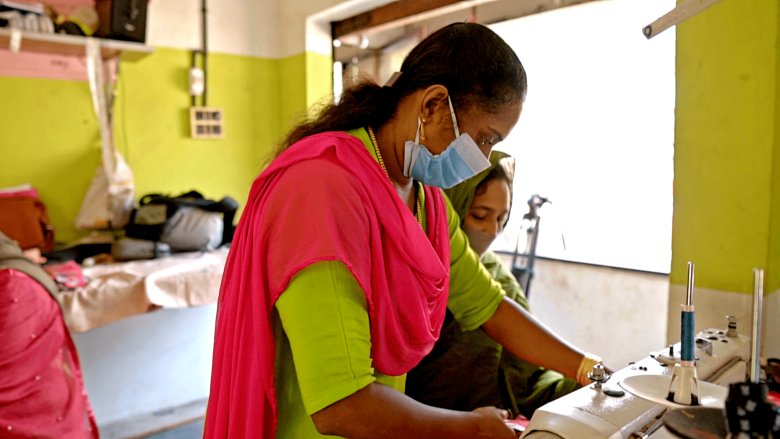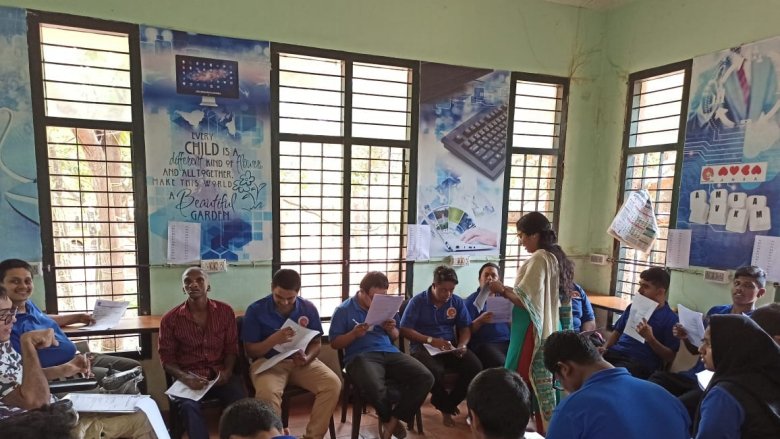The Nai Manzil – New Horizons – Program, run by the Ministry of Minority Affairs, Government of India was supported by the World Bank with a loan of $50 million. The program provides members of the minority community, including school dropouts and people with intellectual and physical disabilities, with an opportunity to receive a certified formal education and skills training. The Program – implemented in 26 states and 3 union territories – included six months of education and three months of skills training, followed by a further six months of support to help them establish themselves. Nai Manzil is benefitting more than 98,000 minority youth across the country by improving their education outcomes and increasing their employability options
Highlights
- The Nai Manzil program provides education and skills training to persons with disability belonging to minority communities.
- Nai Manzil is benefitting more than 98,000 minority youth across the country by improving their education outcomes and increasing their employability options.
- More than 50,700 minority women have benefited from the education and skilling provided by the program.

Empowering minority women in India
Sameera was just 14 years old when she dropped out of school and soon afterwards her impoverished parents arranged her marriage. She stayed at home to cook and clean for her husband’s family, like all the other women in her small fishing community in Kerala’s Malappuram district.
When enrollment for the Nai Manzil program was announced in her village, she joined eagerly with the support of her husband. A year later, Sameera, along with three other women from the program set up Bismil Tailoring, a home-based venture that took in sewing assignments from the community. They earned good money. But the pandemic and the ensuing lockdown took a heavy toll on the nascent enterprise. Despite this, Sameera wasn’t disheartened and managed to get several orders for masks and was able to keep her small family afloat during the crisis. Her education and training, and her exposure to the outside world, had instilled in her a new self-assurance that she could make a go of things, despite the temporary setback. Sameera now plans to study further and become a better entrepreneur.
Kausar Jahan, a mother of three, lives with nine other family members in Hyderabad in the state of Andhra Pradesh. Married off at 17 she had to drop out of school. Fortunately, some years later, Nai Manzil’s training enabled her to get a job at a government hospital providing bed-side care to patients. When the pandemic hit, Kausar was able to support her family with her salary, as her electrician husband was unable to find work. She now uses her training to provide free health services to her community in the old city of Hyderabad.
More than half of Nai Manzil’s beneficiaries are women, with Muslim women constituting the majority. So far, more than 50,700 minority women have benefited from the education and skilling provided by the program.

Helping minority youth with disabilities
Another notable achievement of the Nai Manzil program has been to provide education and skills training to persons with disability belonging to minority communities.
Anas lives with his parents and extended family in Malappuram district in Kerala. He was born with a disability affecting his intellectual and motor skills. His parents worried about how he would support himself when they were no longer around. He had attended special schools for the disabled while growing up, but it was after enrolling in the Nai Manzil program in his district that he started showing improvement. He was able to finish grade 10 and complete a formal skills training program. At 27, Anas was working as a data entry operator, earning his own money and taking care of himself and his family. Although unemployed now due to the lockdown, he is not worried as he knows he has a skill that will help him in the future.
Laxmi was forced to drop out of school at age 10 and was paralyzed from waist down at age 17. An eager student, she lost all hope of ever completing her schooling. She moved to Siddipet near Hyderabad for treatment and joined the Program and completed her education and training. She now works as a bedside assistant in a government hospital. She considers herself very fortunate and now wants to motivate and help other people with disabilities to become self-reliant.
The community mobilizers
At the forefront, and perhaps often forgotten, are the community mobilizers who play a pivotal role in the success and long-term impact of the program. Being a new program, there was a lot of skepticism and distrust among people at the beginning. The onus of collecting data on school dropouts in their area, targeting the deserving communities and then convincing the families to enroll in the Program was the work of these young men and women.
Take for example Samina, who has been working in the hill state of Manipur since 2017. She helped mobilize poor youth from the Christian community to join the program. As part of her work she travels deep into the most underserved areas in the hilly region, meeting with the families and over time gaining their trust. Samina is “overwhelmed” with the appreciation she gets from the people. “Nai Manzil has opened the eyes of minority youth. Many students are in college now. Many are now in Delhi studying nursing, some are getting management training, some are having their own embroidery business,” she says with pride.
While Samina focused on youth from the Christian community, Vandana has been working in the villages of Punjab mobilizing out of school youth, especially young girls from the Sikh community, to join the Nai Manzil program. She says that not every household welcomes them or shows interest. But she perseveres, travelling door to door, talking with the families, convincing the village elders and religious heads to let the girls complete their schooling.
The efforts have borne fruit. Vandana mentions that students who completed grade 10 under the program keep calling her to ask if Nai Manzil can support them to complete grade 12 as well. In fact, seeing the opportunities opening up for their peers, many young people who could not enroll for the program the first-time round, now ask eagerly when the second part of the program will be launched.
